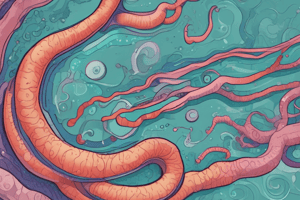Podcast
Questions and Answers
Which biological agent is currently used in IBD and is a human monoclonal antibody against TNFalpha?
Which biological agent is currently used in IBD and is a human monoclonal antibody against TNFalpha?
- Infliximab (correct)
- Adalimumab
- Certolizumab
- Natalizumab
Anion exchange resin colestyramine is indicated for the treatment of chronic diarrhea in Crohn's Disease.
Anion exchange resin colestyramine is indicated for the treatment of chronic diarrhea in Crohn's Disease.
True (A)
What loading dose is recommended for Adalimumab in the treatment of CD?
What loading dose is recommended for Adalimumab in the treatment of CD?
160 mg
Surgery for UC is curative with ________.
Surgery for UC is curative with ________.
Match the following complications with the appropriate treatment:
Match the following complications with the appropriate treatment:
What are the two chronic inflammatory disorders of the gastro-intestinal tract?
What are the two chronic inflammatory disorders of the gastro-intestinal tract?
Genetically, 15% of first-degree relatives have IBD.
Genetically, 15% of first-degree relatives have IBD.
Crohn's disease affects any part of the gastro-intestinal tract, whereas ulcerative colitis affects the ______ and ______ only.
Crohn's disease affects any part of the gastro-intestinal tract, whereas ulcerative colitis affects the ______ and ______ only.
What is the main goal of drug treatment for IBD?
What is the main goal of drug treatment for IBD?
Match the drug with its main use in IBD treatment:
Match the drug with its main use in IBD treatment:
Flashcards are hidden until you start studying
Study Notes
Inflammatory Bowel Disease (IBD)
- IBD is a chronic inflammatory disorder of the gastrointestinal (GI) tract
- Two main types: Crohn's disease (CD) and ulcerative colitis (UC)
- CD can affect any part of the GI tract, while UC affects the colon and rectum only
Causes of IBD
- Unknown, but possible causes:
- Infective
- Immunological
- Dietary
- Psychosomatic
- Environmental factors:
- Diet (fat intake, fast food, milk and fiber consumption)
- Smoking (40% of CD patients are smokers)
- Infection (exposure to Mycobacterium paratuberculosis)
- Stress (can trigger relapse in IBD)
- Genetics: 15% of first-degree relatives have IBD
Pathophysiology of IBD
- Trigger factors cause a severe, prolonged, and inappropriate inflammatory response in the GI tract
- Genetically susceptible individuals are unable to downregulate immune or antigen non-specific inflammatory responses
- Alteration in GIT architecture leads to complications
Clinical Manifestations of IBD
- CD: can affect any part of the GI tract, causing abdominal pain, diarrhea, weight loss, and fatigue
- UC: typically affects the colon and rectum, causing rectal bleeding, urgency, and tenesmus
- Extra-intestinal complications: joint, skin, bone, eye, liver, and biliary tree problems
Investigations for IBD
- Endoscopy: key diagnostic investigation for IBD, allows direct visualization of the large bowel and histopathological assessment
- Radiology: CT scan and MRI complement clinical and endoscopic assessment
- Laboratory findings: raised inflammatory markers, low hemoglobin, and raised platelet count indicate active disease
Management of IBD
- Nutritional therapy: adjunctive or primary treatment, particularly for CD patients who are at risk of malnutrition
- Drug treatment: corticosteroids, aminosalicylates, and immunosuppressive agents (azathioprine, infliximab)
- Biological agents: infliximab, adalimumab, and certolizumab for moderate to severe CD and UC
- Surgery: indicated for treatment of complications, e.g., toxic megacolon, perforation, obstruction, and malignancy
Prognosis
- Prognosis varies depending on the extent and severity of disease
- Colectomy is curative for UC, but relapse is common in CD
Studying That Suits You
Use AI to generate personalized quizzes and flashcards to suit your learning preferences.




